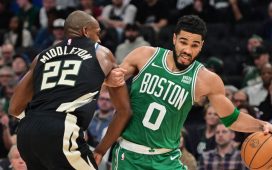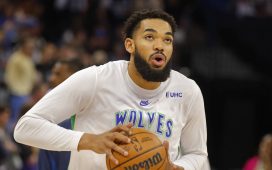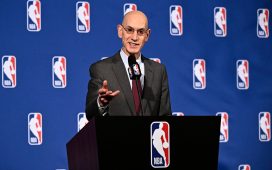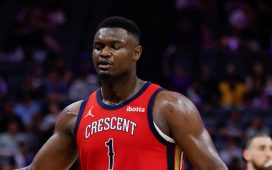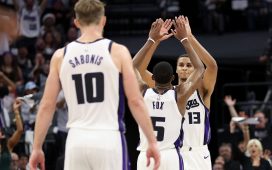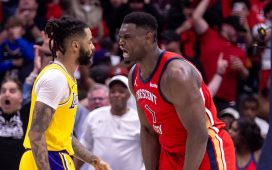The best Kobe Bryant column I ever wrote came from the best, most engaging conversation we ever had, and it never actually got published. It’s my lost column. My favorite memory of him. And I can’t get it out of my head right now.
I think back on that now and it’s hard to explain how this all happened, even to myself — I tried to explain it to Kobe later, but didn’t do a good job. It just happened: Kobe and I talked after a Lakers shootaround at Oracle Arena in December 2000, already his fifth NBA season and a few months after I’d left the Lakers beat at the Los Angeles Times for the San Jose Mercury News.
Kobe initiated the conversation. I was talking to Ron Harper on one spot of the court and felt a hard flick on my left ear, turned around and there was nobody, then turned the other direction and there was Kobe grinning as he walked past me and gesturing that I should join him. Which I did, exiting my chat with Harper about as rudely as I’ve ever bolted from an interview and to this day I owe Harper a bit of an apology for that.
But it was Kobe.
We stood at the free-throw line and reminisced about the last few years and talked about a transition in his NBA career, from young stardom to looming dominance. He agreed that this was coming. That he had been through enough and waited long enough. I don’t know it for sure, but it seemed like it was the first time he had really talked about this in any depth, all stemming from his breakout performance in the 2000 NBA Finals against Indiana, particularly at the end of Game 4 after Shaquille O’Neal had fouled out.
He noted that I must’ve seen this, too. And I did.
As we talked, I could tell Kobe knew this would be make for an interesting column. He was engaged in making this a good column. Maybe a goodbye present?
But it just so happened that Kobe and Antawn Jamison would both score 51 points that night, in an overtime Warriors victory, and I had to switch my column to Jamison, who had also scored 50 the previous game. And I never went back to the Kobe column. Can you imagine that now? But in those newspaper days, I was trained to move on to the next thing, not linger on a past thing, though that was idiotic, obviously, in this case.
I don’t have the full quotes. I think I saved the transcription for a few weeks, but then lost it. I literally wrote over the Kobe column in my computer while he and Jamison were battling, so there wasn’t even a saved version of it anywhere.
But I remember it. After the news of his death, along with eight other people, in a helicopter crash on Sunday, I thought of his 13-year-old daughter, Gianna, also lost; I thought of the others who died in this crash; I thought of the people of Los Angeles; I thought about Kobe’s momentous NBA career; I thought of his evolution to proud fatherhood and Hollywood moguldom; I thought of Kobe’s wife Vanessa and three other daughters.
We all saw the NBA world start to grieve, and I don’t think the totality of this will be fully comprehended for a while.
Mostly, though, I thought of that conversation almost 20 years ago and the transition he was already making, at 22, from an isolated NBA wunderkind, just biding his time to break loose, to full superhero status, with an understanding of so many things going on around him.
He was about to really start clashing with Shaq. He was going to make it tough for Phil Jackson and Lakers management. He was already a “wild horse,” in Phil’s words, but he was going to be much more than that. I’ve never been around an athlete who was more sure that he had to be great and that it didn’t matter what anybody else around him felt about it. There was a burning need for it, or else why have all this talent?
I’ve never felt it more in any person before or since: Greatness at that level was a choice, a sacrifice and, in many ways, a calling.
“You moved because you had to be a columnist,” I remember him saying very seriously. My lord, most of my friends in journalism didn’t even see it that clearly. This was in hilarious comparison to Shaq, who saw me on the same day and asked if I’d been on vacation from the beat, since he hadn’t seen me lately. In no way am I comparing anything I’ve ever done to Kobe’s career, of course. But he saw career arcs. He noted calibrations. He understood hard decisions.
Kobe kept track. Kobe remembered. We didn’t always see eye-to-eye when I covered him, but I knew he was always trying to figure out where we were all coming from, which sometimes helped our stories and sometimes very much didn’t. He was analyzing all the angles. He could be cold, but he was never unaware. He wanted to destroy his opponents, but he also wanted everybody to respect the game as he respected it.
I remember Kobe popping up at the UCLA men’s gym for some workouts when he was a rookie and I was covering UCLA basketball and thinking he was the same age as the Bruins players or younger but just carried himself as something grander.
I remember he didn’t start for the first two seasons with the Lakers, which caused him some amount of frustration. Then Kobe finally forced his way into the starting lineup as a small forward in 1998-99 (my first season covering the Lakers) and felt that he had to prove he could play the position. So Kobe went ahead and grabbed 10, 12, 10, 10 and 10 rebounds in his first five games that season. He just did stuff like that.
I remember when he broke a bone in his right wrist to start the 1999-2000 season and worked on shooting and dribbling with his left; I remember him sitting in the locker room during an exhibition game in Las Vegas openly musing what would happen if he played left-handed. The Lakers thought no, but Kobe was definitely curious.
I remember him being furious at me when an editor added Vanessa’s name to a story about Kobe reportedly getting engaged at a time when Kobe did not want her to be put in the public eye; and I remember that I have never shivered over a story as much as when Kobe glared at me that day. It was both chilling and red-hot rage, at the same time.
I remember him eventually sending word that he understood what happened and that he would talk to me again, but that Vanessa was off-limits from now on, and I honored that.
I remember Kobe playing post-practice 1-on-1 sessions with rookie John Celestand during the 1999-2000 season and I remember never feeling more sorry for a professional athlete than I did for Celestand, who at one point couldn’t even get off a shot against Bryant’s defense and sprinted into the locker room near tears after another thrashing. I remember Kobe shrugging afterward then going into the locker room to make sure Celestand wasn’t too broken up.
I remember Kobe once staring at a TV set that was tuned to golf and having the deepest conversation possible on why I watched and played golf; I remember him saying he would never, ever want to spend hours walking around on a course, that it just seemed stupid to him.
I remember sitting right next to the bench during a road game that the Lakers were losing and listening to interim coach Kurt Rambis imploring the team to pay attention; I remember Kobe turning to a few of us beat writers in the middle of it and shrugging theatrically, as in, “Are you listening to this?” I remember L.A. Times columnist Bill Plaschke reading what I wrote about that — I don’t think I spelled out the gesture directly but implied it — and telling me that the Lakers’ everyday stories were the best drama in the paper.
And I remember texting my pal J.A. Adande when I saw that Bryant was going into epic territory against the Raptors on the night of Jan. 22, 2006. Back then I had League Pass almost singularly to track Kobe’s games: Flip to see what he was doing and if it was something that felt like it was building seismic activity, just keep watching.
I remember calling Adande: Are you watching this? He wasn’t; he was writing his story from Seattle on the NFC Championship Game, which had just concluded. But I told him: Figure out a way to watch this. Kobe, of course, finished with 81 points.
I remember that Kobe wore Joe Montana’s jersey before and after the Lakers’ Game 7 victory over the Sacramento Kings in the 2002 Western Conference finals; I remember asking him about it and he kind of glared back at me. It made sense — if you couldn’t understand it just in your gut, why did he have to explain it?
Kobe wanted to be the greatest player in the history of the sport — or at least during his career — because that was what he was put on this earth to be. Not as a copy of Michael Jordan, as he was often accused of attempting, but as the next step. You had to hurt some feelings to do that, you had to brush up against people who disliked the presumption, but if you were Kobe Bryant, you had to do it.
I’ve thought about this watching or reading biographies of the greatest athletes/artists/thinkers of our time: The greatest ones will not compromise. They just have a ferocious commitment to something that they cannot let go. They will not bargain. They have hard edges. They are the ones who make all the difference, though.
And Kobe was, is and forever shall be the most uncompromising athlete I’ll ever meet.
This is why he maybe wasn’t the most popular player in the league among his peers early in his career but is the most admired and revered athletes of this age to players who grew up watching him in those years.
This is why it was so wonderful to watch him, in retirement, bond with all of these current players, and with women’s players as Gianna’s basketball adventure began to bloom. This is why we all choke up when we realized they died together, traveling to one of her games with a teammate.
This is what I’ll remember more than the scoring titles and championships. I will remember the human decisions that were part of it. I’ll remember the soul of a superhero. I will remember the 22-year-old who decided it was time to be the greatest ever. Right now. I will remember the fearlessness and the ferocity. I will remember that there are parts of his life that are very complicated. I will remember that conversation almost 20 years ago, that ear flick, and that cosmic assurance that this was a moment in time I should not and could not forget.
Read more Kobe Bryant coverage on this topic page
(File photo from 2001: Wally Skalij / Los Angeles Times via Getty Images)

